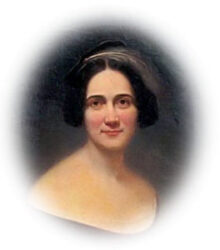May 19th.—Mrs. Fitzpatrick says Mr. Davis is too gloomy for her. He says we must prepare for a long war and unmerciful reverses at first, because they are readier for war and so much stronger numerically. Men and money count so in war. “As they do everywhere else,” said I, doubting her accurate account of Mr. Davis’s spoken words, though she tried to give them faithfully. We need patience and persistence. There is enough and to spare of pluck and dash among us, the do-and-dare style.
I drove out with Mrs. Davis. She finds playing Mrs. President of this small confederacy slow work, after leaving friends such as Mrs. Emory and Mrs. Joe Johnston ¹ in Washington. I do not blame her. The wrench has been awful with us all, but we don’t mean to be turned into pillars of salt.
Mr. Mallory came for us to go to Mrs. Toombs’s reception. Mr. Chesnut would not go, and I decided to remain with him. This proved a wise decision. First Mr. Hunter ² came. In college they called him from his initials, R. M. T., ” Run Mad Tom” Hunter. Just now I think he is the sanest, if not the wisest, man in our new-born Confederacy. I remember when I first met him. He sat next to me at some state dinner in Washington. Mr. Clay had taken me in to dinner, but seemed quite satisfied that my “other side” should take me off his hands.
Mr. Hunter did not know me, nor I him. I suppose he inquired, or looked at my card, lying on the table, as I looked at his. At any rate, we began a conversation which lasted steadily through the whole thing from soup to dessert. Mr. Hunter, though in evening dress, presented a rather tumbled-up appearance. His waistcoat wanted pulling down, and his hair wanted brushing. He delivered unconsciously that day a lecture on English literature which, if printed, I still think would be a valuable addition to that literature. Since then, I have always looked forward to a talk with the Senator from Virginia with undisguised pleasure. Next came Mr. Miles and Mr. Jameson, of South Carolina. The latter was President of our Secession Convention; also has written a life of Du Guesclin that is not so bad. So my unexpected reception was of the most charming. Judge Frost came a little later. They all remained until the return of the crowd from Mrs. Toombs’s.
These men are not sanguine—I can’t say, without hope, exactly. They are agreed in one thing: it is worth while to try a while, if only to get away from New England. Captain Ingraham was here, too. He is South Carolina to the tips of his fingers; yet he has it dyed in the wool—it is part of his nature—to believe the United States Navy can whip anything in the world. All of these little inconsistencies and contrarieties make the times very exciting. One never knows what tack any one of them will take at the next word.
¹ Mrs. Johnston was Lydia McLane, a daughter of Louis McLane, United States Senator from Delaware from 1827 to 1829, and afterward Minister to England. In 1831 he became Secretary of the Treasury and in 1833 Secretary of State. General Joseph E. Johnston was graduated from West Point in 1829 and had served in the Black Hawk, Seminole, and Mexican Wars. He resigned his commission in the United States Army on April 22,1861.
² Mr. Hunter was a Virginian. He had long served in Congress, was twice speaker of the House, and in 1844 was elected a United States Senator, serving until 1861. He supported slavery and became active in the secession movement. At the Charleston Convention in 1860, he received the next highest vote to Stephen A. Douglas for President.
